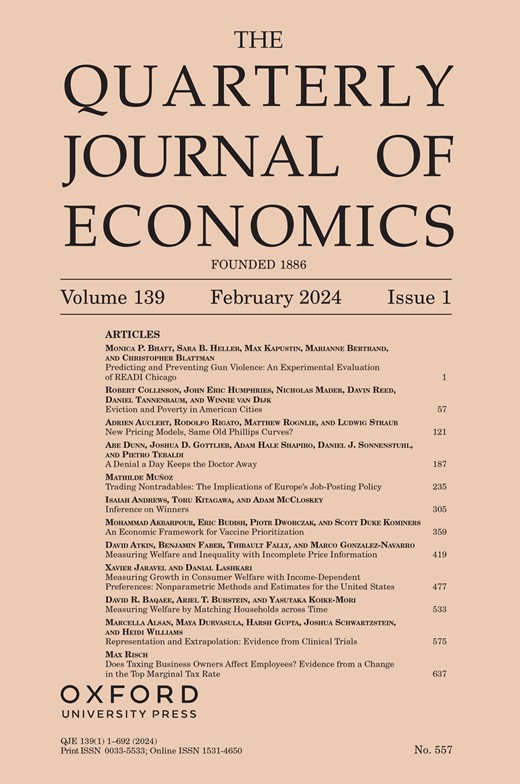Naivete-Based Discrimination
IF 12.7
1区 经济学
Q1 ECONOMICS
引用次数: 71
Abstract
We initiate the study of naivete-based discrimination, the practice of conditioning offers on external information about consumers’ naivete. Knowing that a consumer is naive increases a monopolistic or competitive firm's willingness to generate inefficiency to exploit the consumer's mistakes, so naivete-based discrimination is not Pareto-improving, can be Pareto-damaging, and often lowers total welfare when classical preference-based discrimination does not. Moreover, the effect on total welfare depends on a hitherto unemphasized market feature: the extent to which the exploitation of naive consumers distorts trade with different types of consumers. If the distortion is homogeneous across naive and sophisticated consumers, then under an arguably weak and empirically testable condition, naivete-based discrimination lowers total welfare. In contrast, if the distortion arises only for trades with sophisticated consumers, then perfect naivete-based discrimination maximizes social welfare, although imperfect discrimination often lowers welfare. If the distortion arises only for trades with naive consumers, then naivete-based discrimination has no effect on welfare. We identify applications for each of these cases. In our primary example, a credit market with present-biased borrowers, firms lend more than is socially optimal to increase the amount of interest naive borrowers unexpectedly pay, creating a homogeneous distortion. The condition for naivete-based discrimination to lower welfare is then weaker than prudence.Naivete-Based歧视
我们开始研究基于天真的歧视,即以消费者天真的外部信息为条件提供服务的做法。知道消费者是天真的,会增加垄断或竞争性公司利用消费者错误产生低效率的意愿,因此基于天真的歧视并不能改善帕累托,可能会对帕累托造成损害,并且当基于传统偏好的歧视没有改善时,往往会降低总福利。此外,对整体福利的影响取决于一个迄今为止未被强调的市场特征:对天真消费者的剥削在多大程度上扭曲了与不同类型消费者的贸易。如果这种扭曲在天真和老练的消费者中是同质的,那么在一个可以说是软弱和经验可检验的条件下,基于天真的歧视会降低总体福利。相比之下,如果扭曲只发生在与老练消费者的交易中,那么基于完美天真的歧视会使社会福利最大化,尽管不完美的歧视往往会降低福利。如果这种扭曲只发生在与天真消费者的交易中,那么基于天真的歧视对福利没有影响。我们确定了每种情况的应用程序。在我们的主要例子中,在一个目前有偏见的借款人的信贷市场中,公司的贷款超过了社会最佳水平,从而增加了天真的借款人意外支付的利息,造成了同质扭曲。基于天真的歧视降低福利的条件比谨慎更弱。
本文章由计算机程序翻译,如有差异,请以英文原文为准。
求助全文
约1分钟内获得全文
求助全文
来源期刊

Quarterly Journal of Economics
ECONOMICS-
CiteScore
24.20
自引率
2.20%
发文量
42
期刊介绍:
The Quarterly Journal of Economics stands as the oldest professional journal of economics in the English language. Published under the editorial guidance of Harvard University's Department of Economics, it comprehensively covers all aspects of the field. Esteemed by professional and academic economists as well as students worldwide, QJE holds unparalleled value in the economic discourse.
 求助内容:
求助内容: 应助结果提醒方式:
应助结果提醒方式:


